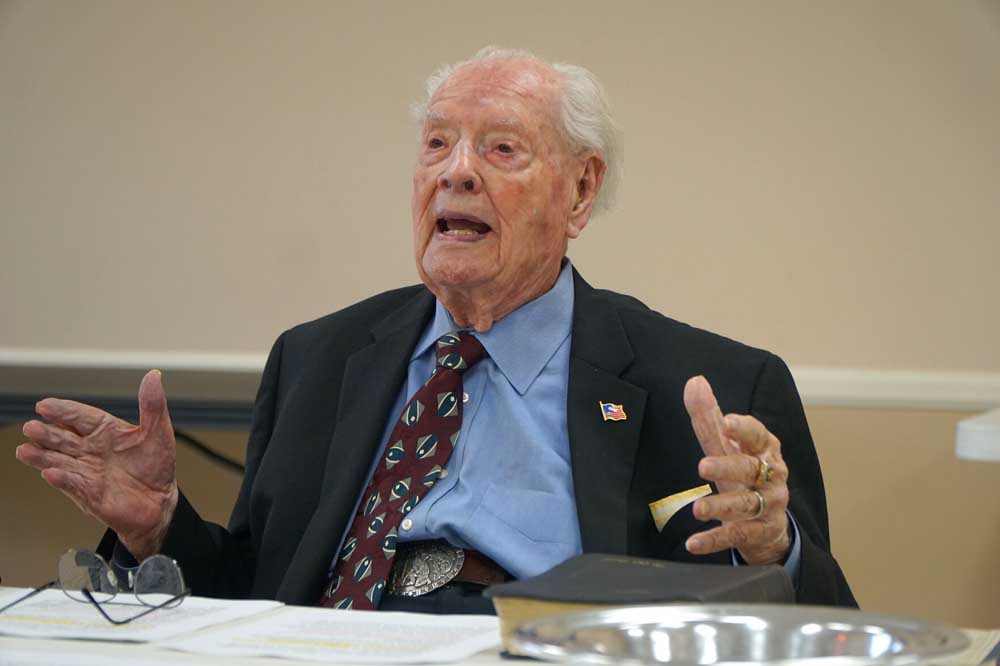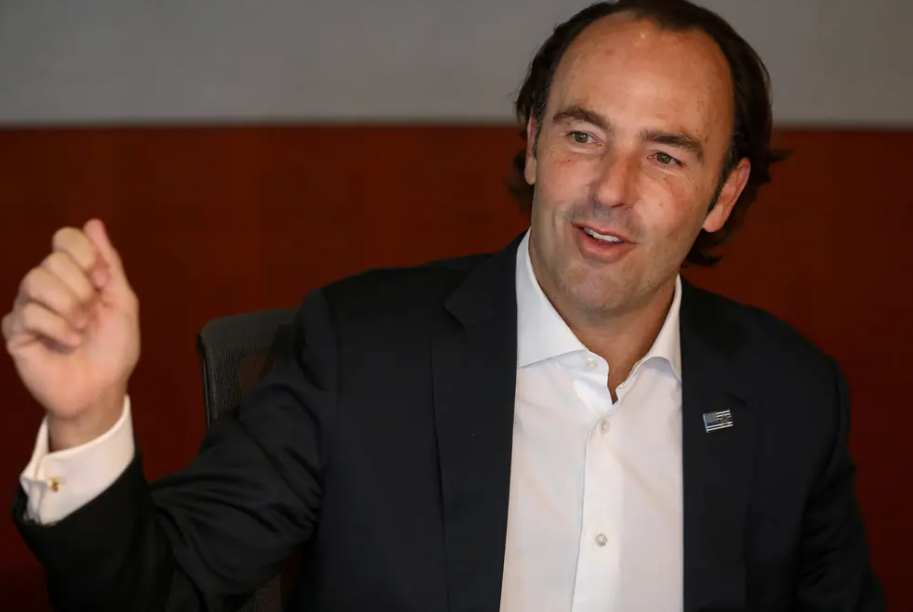‘Shooting for 120’: East Texas World War II veteran has no plans to retire from ministry
Published 5:45 am Friday, May 31, 2024

- Elmer “Jack” Hetzel preaches at the Big Sandy Community Church on April 28. At age 102, the World War II veteran has no plans to retire from the ministry. (Jordan Green/Longview News-Journal Photo)
BIG SANDY — At the age of 102, World War II veteran Elmer “Jack” Hetzel still dons a suit on Sunday mornings to meet his parishioners at the Big Sandy Community Church.
He doesn’t stand behind a lectern or use a microphone. Hetzel sits down behind a folding table at the front of the room with his Bible placed by his left hand. Once the hymns are sung and he has delivered the day’s message, he opens the floor for questions from the crowd.
Trending
“I don’t consider myself a preacher,” he said. “I consider myself a Bible teacher.”
He gives printed copies of his sermon notes to the congregation, and he said he doesn’t know of another pastor who does. Then again, how many other pastors earned a doctorate before they got a high school diploma — and never went to the fourth grade?
“I should be the last person on Earth preaching because of education or lack of it,” he said on a recent Sunday morning after giving a message about “The will of God,” according to his sermon notes.
God’s will, he said, led him to spread the Gospel without much formal education in churches around the nation and the world. His career in ministry started 70 years ago in April 1954. And much like his military career, it was marked by a lot more teaching than learning.
‘Winning’ was the goal
Hetzel was born into a family of ministry. His father traveled the U.S. starting new churches, including one in West Monroe, Louisiana. One of 16 biological children, Hetzel was born on the family’s house boat in the Ouachita River near West Monroe in November 1921.
Trending
The family moved often during his early years — wherever a church was to be started. His family farmed, too. They moved to Buffalo in time for him to complete the third grade, and that’s when his formal education ended; he had to go to work on the farm, he said. As a teenager, he found work building military facilities across Texas.
Then World War II began, and in August 1941, Hetzel became a member of the U.S. Army Air Corps. He was stationed across the U.S. before being deployed to England.
That’s where he met his life’s love — thanks to a $1 bet.
Hetzel had several duties in the Army Air Corps; he called himself a “roustabout,” doing whatever task he was assigned. He was working as a switchboard operator one day when another soldier spent 45 minutes on the phone trying to get a date with a woman operating a switchboard for the Royal Air Force.
“He was cussing her out because she said, ‘No,’ ” Hetzel said. “And I said, ‘Sergeant, you just don’t know how it’s done.’ ”
The sergeant bet Hetzel that he wouldn’t have better luck getting Lilian Burgess to go on a date with him. But Hetzel did. The second time they went out, Hetzel asked her to marry him. Once again, her answer was “yes.”
Hetzel wasn’t on the front lines of a fight in World War II, but he was technically involved in six battles — including the Battle of Saint-Lo and the Battle of the Bulge.
Hetzel was a member of an air support crew in the 511th Fighter Squadron in the 405th Fighter Group, where he fixed planes and loaded 500-pound bombs in aircraft. At one point while the squadron was in Belgium, a shortage of aircraft parts threatened to keep planes out of the sky. Hetzel drove a Jeep towing a trailer, by himself, to France to retrieve parts.
The unit supported Gen. George S. Patton’s Third Army during the Battle of the Bulge, a major turning point in the war. Temperatures were well below zero where the battle was fought in Germany. He still feels the effects of the frostbite that zapped his feet — and he remembers how the battle ended.
“The last eight aircraft that surrendered from the German army surrendered to my unit,” Hetzel said.
Throughout the war, soldiers didn’t have much time to be sentimental or think about what they were fighting for.
“All we thought about was winning,” Hetzel said.
Hetzel was in Paris, France, when the war ended. French people put Hetzel and other troops on their shoulders and carried them through the streets in celebration.
“I weighed a lot less than I do now,” he said.
Although the war was over, however, one battle never ended.
“I still am fighting the Battle of the Bulge,” he said. “My belly keeps wanting to bulge.”
‘Then you can teach it’
Hetzel and his wife started new lives in the U.S. after the war. Hetzel worked as a carpenter building grain elevators, but he found that work didn’t pay the bills. In June 1946, he reenlisted in the Army Air Corps, and that’s where his teaching career began.
Two weeks into a typing course he was taking at Carswell Air Force Base near Fort Worth, an administrator walked into class one day and asked if Hetzel would take over teaching the typing class because the instructor was leaving. But then, plans changed, and Hetzel was asked to teach a class about administration.
“I didn’t have enough education to say, ‘No,’ ” Hetzel said.
He could barely read, and he couldn’t read aloud to others. So, he spent two weeks memorizing the books for the course — and then he was ready for action.
The experience taught him a lesson — something much deeper than administrative regulations.
“From what I have learned in that two weeks, somehow, I grasped,” Hetzel said. “And so, if you grasp something yourself, then you can teach it. Some people are afraid to do it, even though they have grasped it.”
Hetzel served in the U.S. Air Force after the Army Air Corps split into two branches. He later served in the Army.
He was stationed in Germany during the Korean War, serving in administrative roles, which he’d have for the rest of his military career — in addition to classroom duties.
In the last four years of his military service, from May 1959 to May 1963, he taught military science courses at Texas A&M University, training cadets about battle tactics and how the various branches of the military collaborate.
“Cadets think they’re getting teaching to be second lieutenants, because that’s the first promotion they get after college,” Hetzel said. “I said, ‘You think I’m teaching you to be second lieutenants. But I’m not. I’m teaching you to be generals. The rest of it’s up to you after second lieutenant.”
Hetzel’s military career ended after more than 20 years, but his next mission in life would keep him near the troops.
Finding new life
Back in 1953, Hetzel started hanging around the “wrong crowd” in the Army Air Corps. He offered to be the designated driver for a friend who was going out drinking. Hetzel hung around with his beer-drinking buddies, and he eventually found himself drinking heavily, and daily, nearly costing him his marriage. His life was on a “downhill pull,” he said.
But one visit to a church one Wednesday night changed it all for him, he said. He lost the desires to drink, smoke and cuss, and he gives the credit to Jesus Christ.
“I repented of my failures and asked Him to take over my life,” Hetzel said. “And He’s done a pretty good job of it.”
From that point forward, his life’s work was going to be different. Hetzel said God had been wanting him to be a preacher for years, but Hetzel used his lack of education as an excuse not to, he said.
“In 1954, I told God I thought it was OK for me to preach,” Hetzel said. “He’d been after me all those years. That’s one reason I was running down, down, down.”
Hetzel has preached at churches across the nation and the globe ever since then. He gave his first sermon on April 4, 1954, at a church in Comanche. He was invited to speak at Bible colleges, too — places where he was speaking to students and faculty with more education than he had.
Ten years later, shortly after his military career was over, the Assemblies of God sent him as a missionary to Europe, where he assisted military chaplains and taught troops about the Christian life.
“It was wonderful,” he said. “We saw a lot of people come to know Jesus as lord and savior.”
His military experience gave him a connection with the troops their chaplains might not have had, he said. He joined them in combat action, too.
As he preached throughout France, Belgium, England and elsewhere, he had a chance to visit some of the places where he’d served in World War II about two decades earlier. He visited a military cemetery and saw a large American flag flying gently in the breeze. He parked his car to look out over the acreage.
His voice cracked as he recounted the day.
“It made such an impression on me, all of those stones out there — thousands of them — and that flag flying. Man, I just sat there and cried I’d say for several minutes,” he said.
Life-long learner, teacher
When Hetzel returned home, he was about 47 and made up his mind: He wanted “some of that store-bought education.” He attended a Bible college in Waxahachie for two semesters — a college he’d preached at twice before.
“I had never been to college except to speak,” he said.
And he’d never return after those two semesters. Starting at a church in Cleburne, he embarked upon a lengthy career of preaching in churches across the state. Hetzel became a writer, too, penning 11 Christian pamphlets and books, including Bible commentaries and devotionals.
In the 1980s, he and his English wife had a chance to return to her homeland for several years, where Hetzel preached multiple sermons in churches every week. He still keeps in touch with people he met there. Lilian died in 2008, and Hetzel married Patsy French in January 2011.
Hetzel preached in Texas for several years after coming home from England, including Tyler and Waco. In 2015, at the age of 93, he came to Big Sandy to lead the Methodist Church. He lives at the Watkins-Logan Texas State Veterans Home in Tyler.
That year, he received the first degree of his life — the highest one he could be given. He was given an honorary doctorate from the Global Christian Fellowship paying tribute to his long life of preaching and writing. He also began working to obtain his high school diploma, walking across the graduation stage in Big Sandy in 2021.
“I do things backwards,” Hetzel said.
The Methodist Church closed as a result of the coronavirus pandemic and declining attendance, so Hetzel helped start the Big Sandy Community Church. It meets at 9 a.m. on Sundays at the Big Sandy Community Center, 207 E. Gilmer St.
At his age, being an active minister “is glorious,” he said.
“I am enjoying the ministry as much or more than I ever enjoyed it before,” he said. “I am able to help people, and that’s my life. I have a philosophy that I’ve lived by for some time, and that is: I’ll be third. What that means is: God first, you second, and I’ll be third.
“I love people.”
His parishioners say they agree. On a recent Sunday, only a few of the normal dozen or so congregants were present. Among them were 15-year-old Elijah Vincent and his grandmother, Kate Vincent, who moved to Big Sandy from California about two and a half years ago.
Hetzel has become a mentor to Elijah, Kate Vincent said.
“That’s one of the main reasons we like to be here every week so that they can interact,” Kate Vincent said. “[Hetzel is] so respectful for young people, and young people have so much to gain from a person of that kind of experience and age.”
Elijah Vincent described Hetzel as a father figure and an older brother.
“He definitely knows the Bible,” Elijah Vincent said.
Hetzel keeps his messages simple and easy to understand, Kate Vincent said. And his loud, booming voice makes him easy to hear, too. They sometimes forget how old he is.
“He’s got a lot of vitality,” Kate Vincent said. “Vitality for the Lord.”
Eric Waller, who led the hymn singing that Sunday morning, said Hetzel has a wealth of wisdom to share. And he’s dedicated to his ministry. He once preached a sermon only a couple of days after having a car wreck that left him badly bruised.
“He is a soldier, and he soldiers on. He leads by example,” Waller said. “I’ve got a lot to learn from him.”
As for soldiering on, Hetzel said he has no plans to retire from the ministry — or leave this life — anytime soon. He points out that Moses, the man whom God called to lead the Israelites, died in good health at the age of 120.
“I’m shooting for 120,” he said. “I don’t expect to get sick and depend on other people to look after me. I expect that I’ll live until God’s finished with me, and then He’ll say, ‘Come on, boy. Time for you to go home.’ ”
In the meantime, more teaching awaits. Even though he had two semesters of Bible college, that was only a portion of the learning he had in life. He said he believes that was God’s plan.
“All of my education, except those two semesters, came by ‘doing,’ ” he said.







